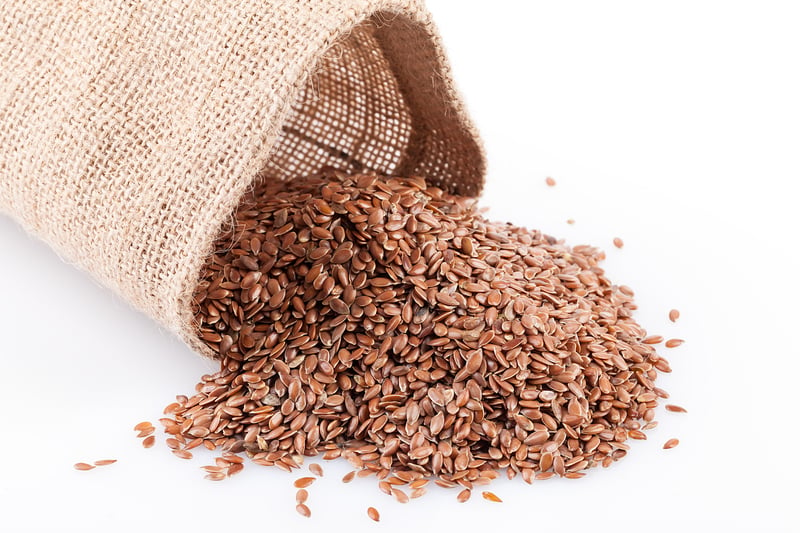Ask the Coaches— Which is Best: Flaxseed or Fish Oil?

Dear Coach,
Q:Is flaxseed a good substitute for fish oil? And which is best: flaxseed or fish oil?
Sincerely,
-Mary
That’s a super question, Stacy. Thanks for asking! The short answer is no. However, as you’ll see, it’s perfectly fine—and perhaps a really good idea—to include both as part of an overall healthy diet and lifestyle. Let’s dig in a little more to see why.
Flaxseed or Fish Oil?
For starters, flaxseed and fish oil both provide omega-3 fats. Omega-3 fats are considered “essential” because we need them, yet our bodies don’t produce them. Thus, it’s essential we get them from food, supplements, or both. Because flaxseed and fish oil (as well as fatty fish) contain omega-3 fats, it’s not uncommon for folks to think they can be used interchangeably. And flaxseed is a particularly attractive option for plant-based eaters (i.e., vegetarians, vegans).
However, there are several fats under the omega-3 umbrella. This is where a very significant difference comes into play. Specifically, fish oil provides the omega-3 fats EPA and DHA, which are incorporated into the walls of cells (called cell membranes) that make up the various tissues (e.g., brain, retina, heart). These fats help improve the properties of cell membranes (e.g., fluidity, suppleness). And supplementation with EPA and DHA has been shown to lead to a wide range of health benefits, including:
- • heart health
• mood
• brain health
• immune function
• skin health
• metabolic function
• body composition
• anti-aging
• and more.
These bad boys are so important that the American Heart Association recommends adults consume a minimum of 500 mg/day of EPA and DHA. Often, more is better. The unfortunate reality is that the average person consumes only about a quarter of that amount (around 135 mg/day).1,2
On the other hand, flaxseed contains a different type of omega-3 called ALA. While it is possible for the body to convert ALA to EPA or DHA, this process is remarkably inefficient. The conversion rate varies on certain conditions, on average, yet it’s estimated that less than 0.5% of ALA gets converted to EPA or DHA.3
As you can see in the graph below, supplementation with ALA has very little effect on blood levels of EPA or DHA—or ALA for that matter. On the other hand, EPA and DHA supplementation dramatically increases blood levels. Interestingly, DHA can even boost levels of EPA. (This is one of several reasons why supplementing with a high-DHA supplement is a good idea.)

With that in mind, a fish and/or krill oil supplement is typically the best option for folks who fail to get enough EPA and DHA from cold-water fatty fish. Another great option, especially for plant-based eaters, is algal oils, as algae is the primary producer of EPA and DHA in the ecosystem. (Fish eat algae, and you know what they say, “You are what you eat.”)
Having said all that, flaxseed is not a good substitute for fish, krill, and/or algal oil. However, that does not mean it doesn’t have some potential health properties and benefits of its own. Heck, the Latin name of the flaxseed is Linum usitatissimum, which means “very useful.”4
For starters, ALA appears to be burned off at a pretty significant rate, which explains why it doesn’t have much of an effect on blood levels as shown in the graph above. In other words, there appears to be an increase in fat burning. What’s more, like DHA (and to a lesser extent EPA), ALA does seem to have some anti-inflammatory properties.
In addition to ALA, flaxseed also contains lignans, which have both antioxidant and anti-inflammatory properties. What’s more, flaxseed is a very good source of fiber, which is well-known for its benefits on heart health, glycemic control, digestive health, and weight management.
Along those lines, studies have shown that consumption of flaxseed may have a cardioprotective effect, including an improvement in blood pressure.5 Not surprisingly, recent studies have shown that regularly consuming flaxseeds improves markers of heart health (e.g., triglycerides, cholesterol, C-reactive protein), increases satiety or meal satisfaction, improves appetite control (e.g., reduced hunger hormones), reduces caloric intake, and reduces the glycemic response to a meal.4
It’s worth noting that whole or ground flaxseeds seem to offer the greatest health benefits compared to flaxseed oil. What’s more, ground flaxseeds provide both insoluble and soluble fiber while whole flaxseed only provides the former. In addition, the body cannot access the other “good” stuff (e.g., healthy fats, lignans) in whole flaxseed. With that in mind, milled flaxseed may be your best option.
In conclusion, when it comes to the question of flaxseed or fish oil, they both have specific strengths but fish oil is clearly better for your health. I hope that answers your question, Stacy, and helps you enjoy all the benefits both fish oil and flaxseed have to offer. Please let us know if we can help with anything else.






